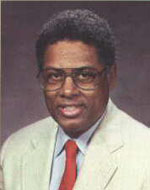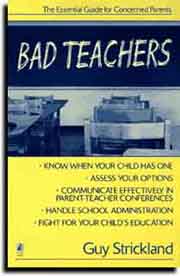|
|
Thomas Sowell
ONCE YOU HAVE gotten used to a whole vocabulary of euphemisms, it can be shocking
to come across the plain truth. The title of a new book may therefore jolt some people: Bad
Teachers
by Guy Strickland.
If every parent whose child has had a bad teacher were to buy this book, it would hit
the top of the best-seller list in no time. More important, millions of parents would learn
how to recognize signs of a bad teacher -- and how to cope with the evasions and
"Bad Teachers" is written in plain English, unlike the pious gobbledygook of most
education literature and most educators.
The education establishment will not be able to dismiss Guy Strickland the way they
dismiss other critics, by saying that those critics don't really know what it is like inside
the schools today, that they don't have all that wonderful "expertise" and experience
that teachers supposedly have. Strickland was both a teacher and a principal before he
became an education consultant.
This book not only acknowledges that there are bad teachers, it also recognizes the
lasting damage they can do to children and the virtual impossibility of firing them. A
classic example was a teacher who "molested children at five different schools" but
who "was never arrested or even fired, just transferred on to the next school."
Most bad teachers are not that bad. But even those who are merely well-meaning
incompetents can do lasting damage to a child. Hurt feelings, psychological scars and
negative reactions to the learning process can be among the consequences that can
follow a child for years, producing an ill-educated adult who will pay for the rest of his
life for not having gotten a good education.
Guy Strickland offers many practical suggestions for what parents can do to minimize
the damage done by bad teachers. However, unlike the education establishment
literature, "Bad Teachers" does not assume that there are always "solutions" that will
make things right. Sometimes the only thing that will work is getting your child
transferred to another teacher or another school. And neither is easy.
This book does not buy the malarkey that teachers and principals know best because
they have some mysterious "expertise" that mere parents cannot hope to fathom. The
author says: "Who is Qualified to Judge a Teacher? You Are!"
He asks: "What is a good car wash? Is it the one certified by the American Society of
Car Washes? Is it the one endorsed by the Chamber of Commerce? No. It's the one
that people keep going to, because it does a good job of cleaning cars."
By the same token, good teachers are those whose students learn, not those with
worthless certificates and diplomas from schools of education -- "pieces of paper that
signify nothing," as the author aptly puts it.
Too many parents are intimidated by the lofty airs and pompous jargon of "educators."
This book tries to put some backbone in such parents and let them know how to deal
with the tactics that educators have developed for dealing with them.
One chapter is titled, "High Noon: Confronting the Teacher." It runs through various
defenses and ploys used by the education establishment to evade responsibility for bad
teaching.
The most brutal reality of all is this: "No one really cares whether your child learns
anything at school." All sorts of people have all sorts of other agendas -- from the
teachers' union lobbyist who is paid to protect teachers from competency testing to
principals who will readily "sell your child down the river" to keep the teachers happy
and the district office out of their hair.
Education in general has a very low priority with people who call themselves educators.
Out of 145 possible goals, none of the top 8 selected by teachers had anything to do
with academics. "Self-esteem" stood at the top, followed by such things as "attitude"
and "socialization" -- in short, things designed to turn your child into the kind of person
the teacher wants him or her to be, which may bear no relationship to the kind of
person you are trying to raise your child to be.
If you buy only one book on education in your lifetime, this is the one to buy. I say that
as the author of a couple of books on education myself. But I am willing pass up some
sales of my own books in order to urge you to buy this
 Bad Teachers
Bad Teachers
 doubletalk that parents are likely to encounter from the teacher, the principal and other
school officials.
doubletalk that parents are likely to encounter from the teacher, the principal and other
school officials.
 Book now available for online purchase! |
4/15/98: "Clinton in Africa
"
4/13/98: "Bundling and unbundling
"
4/9/98: "Rising or falling Starr
"
4/6/98: "Was Clinton ‘vindicated'?
"
3/26/98: "Diasters -- natural and political"
3/24/98: "A pattern of behavior"
3/22/98: Innocent explanations
3/19/98: Kathleen Willey and Anita Hill
3/17/98: Search and destroy
3/12/98: Media Circus versus Justice
3/6/98: Vindication
3/3/98: Cheap Shot Time
2/26/98: The Wrong Filter
2/24/98: Trial by Media
2/20/98: Dancing Around the Realities
2/19/98: A "Do Something" War?
2/12/98: Julian Simon, combatant in a 200-year war
2/6/98: A rush to rhetoric